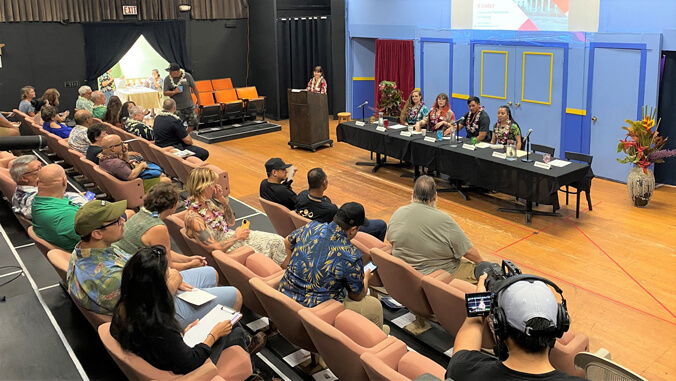
Hilo residents are less satisfied with the Hawaiʻi Police Department (HPD) compared to the past, according to a survey project by University of Hawaiʻi at Hilo students. However, the findings contradict stories from residents about personal encounters with officers.
For “Community Perspectives on Policing,” students in a sociology class on criminology created a survey, carried out in-person interviews with 250 longtime residents, analyzed data, and created several products including a website, digital infographics, a video and a community presentation. The goal was to assess how people in the East Hawaiʻi region currently feel about the police, and then compare—if possible—those perceptions with how people felt about the police during an earlier era (1930–70).
The students shared their findings during a community forum that included Hawaiʻi Island Mayor Mitch Roth and new Chief of Police Ben Moszkowicz in May.
The project was initiated by the East Hawaiʻi Cultural Center, and the student researchers were sociology and administration of justice majors. The class, taught by Assistant Professor of Sociology Ellen Meiser, was broken up into two parts. Students spent the first half of the semester learning about theories of crime (i.e., what are the social forces that influence people to commit crimes), and the second half was spent being introduced to the players of the criminal justice system (i.e., the police, offender, victim, prosecutors, public defenders and judges).
“The goal is for students to better understand the roles of crime and the criminal justice system in our society,” Meiser said.
The survey covered several areas, including how the public feels about safety on the streets, public perceptions of the police, and about how people are impacted by incarceration directly or within their family.
Contradicting personal experiences
Meiser said the survey results about perceptions seem to contradict community members’ actual experiences with the Hawaiʻi Police Department.
“In fact, most people who had interactions with HPD over the past five years found those experiences to be just and equitable. These folks also described HPD officers in largely positive terms,” Meiser said. “This contradiction, we argue, is likely due to national anti-police sentiment and local anecdotes about bad-apple officers.”
Meiser said the students’ study also provides the Hawaiʻi Police Department with recommendations directly from the community on how to improve these attitudes.
“We’ve shared [the recommendations] with HPD and their police chief directly,” she said. “Hopefully, they will deeply consider what the community recommends and make some productive changes.”
To read more, visit UH Hilo Stories.
—By Susan Enright

